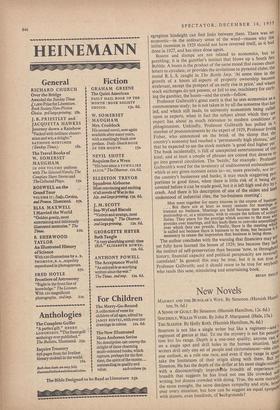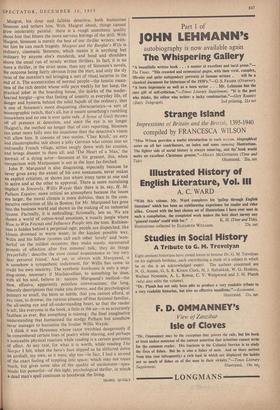New Novels
MAIORET AND THE BURGLAR'S WIFE. By Simenon. (Hamish ton, 9s. 6d.) A SENSE OF GUILT. By Simenon. (Hamish Hamilton, 12s. 6d.) SINCERELY, WILLIS WAYDE. By John P. Marquand. (Hale, 15s.) THE SLEEPER. By Holly Roth. (Hamish Hamilton, 9s. 6d.) SIMENON is not like a single writer but like a regiment—and° regiment of genius at that. To me the mystery is not his penetra; tion but his range. Depth is a one-man quality; anyone can 51 on a single spot and drill holes in the human situation. Most writers drill only one set of people and circumstances—one class' one outlook, as a rule one race, and even if they range in spneci take the limitations of their origin along with them. But 11 Simenon. He has the depth of the driller at his most single-minds , with a disconcertingly improbible breadth of experience- breadth breadth that suggests he has lived not one life crowded Wish writing, but dozens crowded with doing. True, the same moral the same eyesight, the same deadpan sympathy and style, bro° over every situation; but how can he suggest an equal symput° with dozens, even hundreds, of backgrounds?
Maigret, his dour and fallible detective, both humanises Simenon and tethers him. With Maigret about, things cannot grow intolerably painful : there is a rough anesthetic quality about him that blunts the more nervous borings of the drill. With Maigret, Simenon is merely the best of our thriller writers; with- out him he can reach tragedy. Maigret and the Burglar's Wife is ordinary, cinematic Simenon, which means it is anything but ordinary by anyone else's standards, and head and shoulders above the usual run of tersely written thrillers. In fact, it is no more a thriller, in the strict sense, than any of Simenon's novels, the outcome being fairly obvious from the start, and only the sly twist of the moralist's tail bringing a sort of ritual surprise to the end of it. The eccentricities of normal people—the lunatic mean- ness of the rich dentist whose wife pays weekly for her keep, the Practical joker in the boarding house, the quirks of the tender- hearted burglar—give that feeling of insanity in everyday life, of danger and hysteria behind the solid façade of the ordinary, that is one of Simenon's more disquieting characteristics—a sort of seismographic twitch, that's all, but it means something's rumbling somewhere and no one is ever quite safe. A Sense of Guilt throws off all pretence at detection, and since the eye is no longer Maigret's, the method no longer that of curt reporting, Simenon can enter more fully into his situations than the detective's vision will allow him. It consists of two stories, 'Chez Krull,' an eery and claustrophobic tale about a jolly German who comes into an unfriendly French village, settles snugly down with his cousins, and brings disaster to them all; and 'The Heart of a Man,' the Portrait of a dying actor—Simenon at his greatest, this, when comparison with Matipassant is not in the least far-fetched.
John P. Marquand is also disquieting, especially because he never gives away the extent of his own uneasiness, never makes an explicit criticism, or shows just where irony turns at one end to satire and at the other to approval. There is more moralising implicit in Sincerely, Willis Wayde than there is in, say, H. M. Pulham Esquire; more critical an atmosphere because the issues are larger, the moral climate is more dubious, than in the com- parative restriction of life in Boston; for Mr. Marquand has gone into the business world and shoWn us the making of an industrial tycoon. Factually, it is enthralling; fictionally, less so. We are shown a world of cotton'wool emotions, a treacly jungle where How to Win Friends and Influence People sets the tone. Ruthless- ness is hidden behind a perpetual ogle; people are dispatched, like kittens drowned in warm water, in the kindest possible way. Willis and his fellow tycoons call each other 'lovely' and 'won- derful' on the mildest occasion; they make manly, stammered protests of affection after five minutes' talk; they do things 'prayerfully'; describe the most casual acquaintance as 'my very dear personal friend.' And yet, as always with Marquand, It is somehow a sympathetic indictment, for• Willis has come to credit his own sincerity. The synthetic bonhomie is only a step- Ping-stone, necessary if Machiavellian, to something he does, with all his soul, believe in : success. Marquand's method—the slow, effusive, apparently pointless conversations; the long, leisurely descriptions that make you drowsy, and the psychological Pointers so small, the hints so subtle, that you cannot afford, at any time, to drowse; the curious absence of that fictional familiar, the all-seeing eye and all-understanding heart, so that the reader is left, like everyone in the book, a little in'th air—is as accurately faultless as ever. But something is missing: the final imaginative understanding that humanised the stodgy Pulham but somehow never manages to humanise the livelier Willis Wayde:
I think it was Housman whose razor trembled dangerously if he remembered certain lines of poetry while shaving, and perhaps a noticeable physical reaction while reading is a certain guarantee of effect. At any rate, for what it is worth, while reading The Sleeper I felt, when the hero's foot slipped as he slithered down an airshaft, my own, as it were, slip too—in fact, I had a second of the exact feeling of toppling into space; which may not mean much, but gives some idea of the quality of excitement—spas- modic but powerful—of this tight, psychological thriller, in which a dead man's spell continues to hoodwink the living.
ISABEL QUIGLY



































 Previous page
Previous page